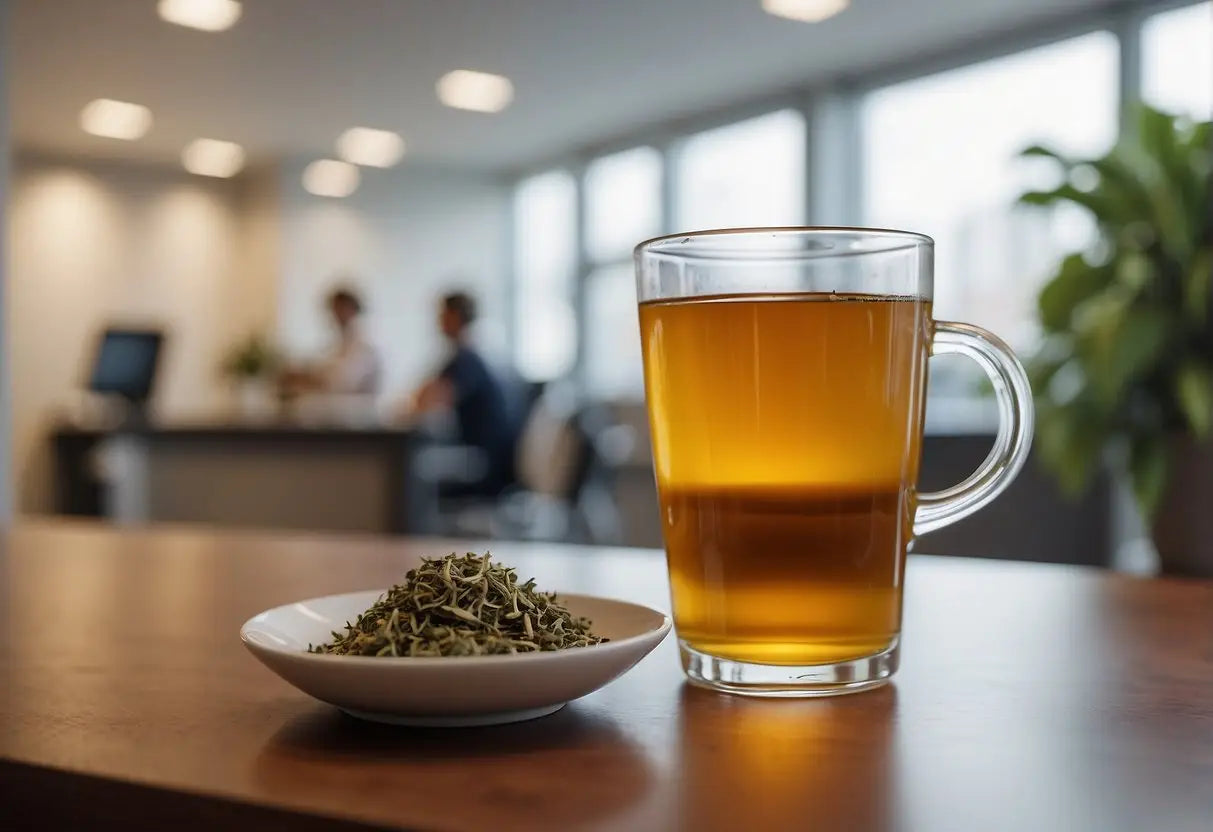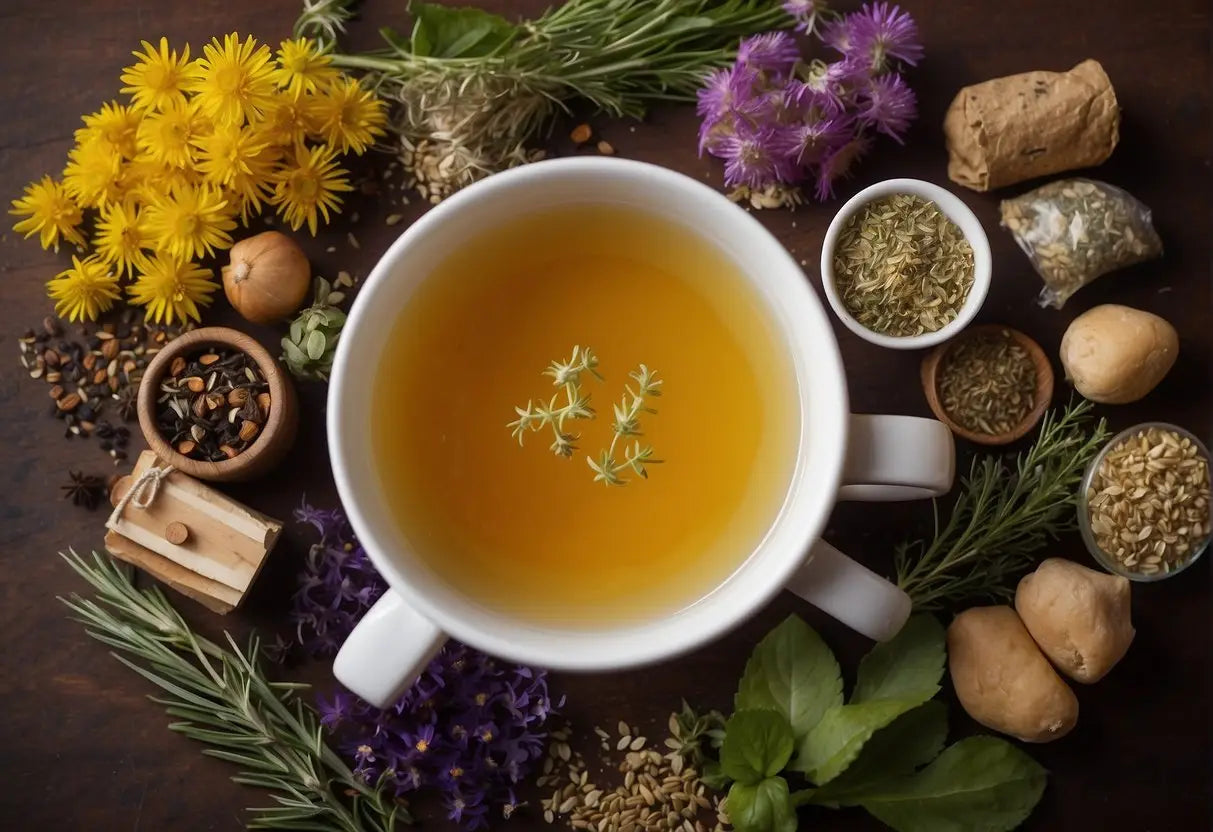What Tea is Good for UTI
Urinary Tract Infections (UTIs) are common infections that can be effectively managed with the correct knowledge. It’s important you understand the causes, recognize the symptoms, and know how to prevent them.
Causes of UTIs
UTIs are primarily caused by bacteria entering the urinary tract. Here is a breakdown of the common causes:
- Unhygienic practices: Poor bathroom hygiene can lead to bacteria spreading.
- Sexual activity: New or multiple partners increase the risk of bacterial transfer.
- Personal anatomy: Women are at higher risk due to a shorter urethra.
- Blockages: Kidney stones or an enlarged prostate can trap urine and cause infection.
- Suppressed immune system: Conditions or medications that lower immunity can increase susceptibility.
- Catheter use: Long-term catheter use can introduce bacteria into the bladder.
Symptoms of UTIs
Recognizing the symptoms early can lead to prompt treatment:
Bestsellers
- Pain or burning: When urinating, you might feel discomfort.
- Frequent urination: Despite little output, you may have a strong urge to urinate often.
- Urine appearance: Cloudy, red, or strong-smelling urine can be indicative.
- Pelvic pain: Women may experience pain in the pelvic area.
- Fevers or chills: These can signify that the infection has reached the kidneys.
Prevention of UTIs
You can take steps to reduce your risk:
- Hydration: Drink plenty of water to help flush out bacteria.
- Hygiene: Wipe front to back and urinate after intercourse.
- Clothing: Wear breathable fabrics to keep the area dry.
- Bathroom habits: Don’t hold it in. Urinate regularly to clear out bacteria.
- Cranberry Juice: Some evidence suggests it can prevent bacteria from adhering to the bladder.
Tea as a Remedy
When dealing with urinary tract infections (UTIs), certain teas may offer relief alongside medical treatment. Here's what you need to know:
-
Chamomile Tea: A soothing option that may help reduce bladder discomfort and the urgency to urinate, thanks to its anti-inflammatory properties.
- Dandelion Tea: Acts as a diuretic, which can increase urine flow and flush bacteria from the urinary tract.
-
Parsley Tea: A mild diuretic which may support the bladder by increasing urine output, potentially aiding in the elimination of bacteria.
- Hibiscus Tea: Contains compounds that might have antibacterial effects and could help prevent bacteria from adhering to the bladder walls.
Remember, you should integrate these herbal teas into a comprehensive treatment plan. It's crucial to consult with a healthcare provider before using herbal teas for UTI symptoms as they may not replace the need for traditional medications, and their efficacy is supported by limited clinical evidence. Hydration is also key; ensure you consume plenty of fluids to aid in flushing out bacteria.
Herbal Teas for UTIs

Certain herbal teas may offer relief and support during urinary tract infections (UTIs). They contain compounds that can possess antibacterial, anti-inflammatory, and diuretic properties which can be beneficial.
Green Tea
Green tea is rich in catechins, which are antioxidants with potential antibacterial effects that could help reduce the bacteria causing UTIs. One study shows that regularly drinking green tea may have preventative properties.
Chamomile Tea
Chamomile tea, known for its anti-inflammatory properties, may help alleviate the discomfort that comes with UTIs. It can also aid in relaxation and help improve sleep during recovery.
Dandelion Tea
Dandelion tea acts as a diuretic, increasing urine production, and potentially flushing out infection-causing bacteria. It might also reduce inflammation.
Parsley Tea
Parsley tea is another diuretic that can help increase urine flow, potentially speeding up the elimination of infection-causing agents. Moreover, its antioxidant compounds may support overall urinary health.
Hibiscus Tea
Hibiscus tea contains compounds like flavonoids and has been studied for its antimicrobial properties against E. coli, a common bacterium involved in UTIs. Drinking hibiscus tea might help in managing UTI symptoms.
Lao Ban Zhang
Proper Preparation of Therapeutic Teas
When preparing therapeutic teas for urinary tract infections (UTIs), it's critical to follow proper techniques to maximize their potential benefits.
Step 1: Choose High-Quality Ingredients
- Opt for organic herbs when possible to minimize exposure to pesticides which can aggravate UTIs.
- Select the right kind of tea. Cranberry, hibiscus, and dandelion teas are known for their potential UTI-fighting properties.
Step 2: Use the Right Water
- Begin with fresh, cold water that is preferably filtered to avoid contaminants.
- Bring water to a soft boil, typically around 208°F – just below a full rolling boil.
Step 3: Steeping
- Preheat your teacup or teapot to maintain the water temperature during steeping.
- Use one teabag or one tablespoon of loose tea per 8 oz of water.
- Cover the tea cup or teapot. Steep for a recommended 5-10 minutes. Longer steep times help to extract more of the active substances from the herbs.
| Tea Type | Water Temperature | Steep Time |
|---|---|---|
| Cranberry Tea | 208°F | 8-10 min |
| Hibiscus Tea | 208°F | 5-7 min |
| Dandelion Tea | 208°F | 5-10 min |
Step 4: Consumption
- Consume the tea while it is still warm but not overly hot.
- Integrate these therapeutic teas into your daily routine, aiming for 2-3 cups per day to assist with UTI symptoms.
Remember, these teas are not a standalone cure and should be used in conjunction with advice from a healthcare provider. Always consult with a professional before utilizing herbal remedies as part of your health regimen.
Other Natural Remedies for UTIs
In addition to tea, certain natural remedies may help prevent urinary tract infections (UTIs) or aid in the recovery process. These remedies include specific liquids and nutrients that support urinary health.
Cranberry Juice
Cranberry Juice has long been recommended for those with UTIs. Studies suggest that cranberry juice can inhibit the adhesion of bacteria to the urinary tract walls, potentially reducing the incidence of UTIs. However, it's essential to choose a pure, unsweetened cranberry juice to avoid excess sugar.
Probiotics
Probiotics are beneficial bacteria that can support general health, including the urinary system. Regular consumption of probiotics, found in foods like yogurt, kefir, and fermented products, may help maintain a balanced bacterial environment in the gut and urinary tract, reducing the risk of infections.
Water Intake
Water Intake is critical for flushing bacteria from the urinary tract. It's recommended that you drink plenty of water throughout the day, aiming for:
- Women: About 2.7 liters (91 ounces) daily
- Men: About 3.7 liters (125 ounces) daily
Staying hydrated helps dilute your urine and ensures that you'll urinate more frequently, allowing bacteria to be flushed from your urinary tract before an infection can begin.
Vitamin C
Vitamin C is believed to increase the acidity of urine, which helps kill off bacteria and boost immunity. Including vitamin C-rich foods in your diet, such as oranges, red peppers, and kiwifruit, or taking a vitamin C supplement can be beneficial. It’s important to consult with your healthcare provider before starting any supplements.
When to See a Doctor

If you suspect you have a Urinary Tract Infection (UTI), it's crucial to monitor your symptoms closely. While certain teas may offer relief, they are not a substitute for professional medical treatment. Here's when you should seek medical attention:
- Persistent Symptoms: If your symptoms, such as painful urination, urgency, and abdominal pain, persist for more than a couple of days, it’s time to contact your doctor.
- Fever and Chills: A fever or chills could indicate that the infection has reached your kidneys. Seek immediate care.
- Blood in Urine: Visible blood in your urine is a sign to get medical help without delay.
| Symptom | Action Required |
|---|---|
| Worse or no improvement | Call your healthcare provider |
| Pain in lower back or side | Possible kidney involvement; see a doctor promptly |
| Nausea or vomiting | Seek immediate medical attention |
| Increased fatigue or shakiness | Could indicate a more serious condition |
Remember, timely intervention can prevent complications. If you're pregnant, have diabetes, or have previously experienced recurrent UTIs, it's particularly important to consult a healthcare professional early. Your doctor may prescribe antibiotics, which are the standard treatment for a UTI.
It's essential to complete the prescribed course of medication even if your symptoms improve before finishing the antibiotics. Failure to do so can result in a relapse or contribute to antibiotic resistance. Always follow your doctor's advice regarding UTI treatment and management.
Risks and Considerations

When considering teas for urinary tract infection (UTI) relief, be aware of the following risks and considerations:
-
Allergies: Ensure you are not allergic to any ingredients in herbal teas.
-
Caffeine Content: Avoid teas with high caffeine content, as they can irritate the bladder.
-
Medicinal Interactions: Some teas may interact with medications. Consult your doctor before starting any new herbal remedies.
-
Sugar Content: Avoid adding sugar to your tea; sugar can promote bacterial growth.
-
Overconsumption: Drinking excessive amounts of liquid, even tea, can be harmful. Keep your intake moderate.
-
Pregnancy and Breastfeeding: Certain herbs can be risky if you're pregnant or breastfeeding. Always check with a healthcare provider.
Key Points to Remember:
-
Consult Healthcare Providers: Before trying herbal teas for UTI symptoms.
-
Stay Hydrated: But don't overdo it. Drink enough to help flush out the urinary system.
-
Opt for Quality: Choose organic teas to avoid pesticides and other contaminants that could exacerbate UTI symptoms.
-
Monitor Your Symptoms: If symptoms worsen or persist, seek medical attention.
Remember, while some herbal teas may provide comfort during a UTI, they are not a substitute for antibiotics and other medications prescribed by a healthcare provider.
Frequently Asked Questions

Teas can offer symptomatic relief for urinary tract infections (UTIs) and support bladder health. Certain ingredients in teas can have antimicrobial properties while others can potentially worsen symptoms. It is important to choose teas that contribute to your well-being.
Which teas are beneficial for bladder health?
Herbal teas containing dandelion, hibiscus, and parsley may support bladder health. These ingredients can have a diuretic effect, helping to flush the urinary tract and reduce infection risk.
Can certain teas exacerbate urinary tract infections?
Caffeinated teas might irritate your bladder and can contribute to dehydration, potentially worsening UTI symptoms. It's advisable to limit or avoid these when dealing with a UTI.
Are there any herbal teas that can help with bacterial infections?
Herbal teas with ingredients like uva-ursi, garlic, and echinacea have been known to possess antibacterial properties that may help combat the bacteria causing a UTI.
What role does chamomile tea play in treating urinary tract infections?
Chamomile tea may help soothe the urinary tract due to its anti-inflammatory properties, potentially providing relief from the discomfort caused by UTIs.
How effective is ginger tea in managing urinary tract infection symptoms?
Ginger tea has strong anti-inflammatory properties which can help reduce bladder inflammation and may alleviate pain associated with UTIs.
What natural supplements assist in the prevention or treatment of urinary tract infections?
Supplements such as cranberry extract, probiotics, and vitamin C can support urinary tract health and may assist in preventing or treating UTIs. However, consult with a healthcare provider before starting any new supplements.
← Older post Newer post →











